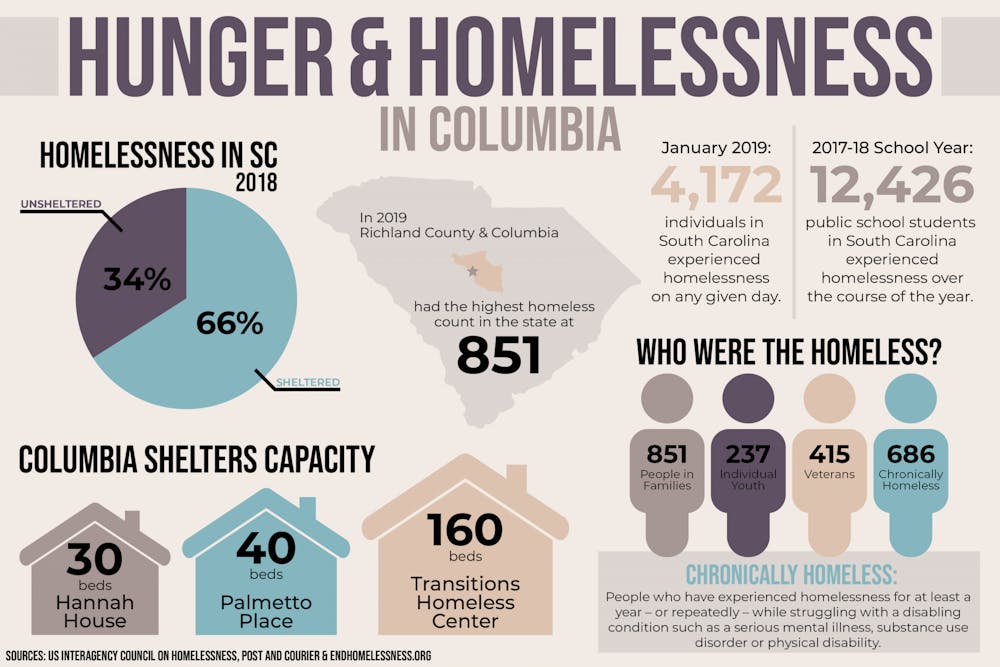Organizations such as Gamecock Pantry, Transitions Homeless Center, Palmetto Place and the Hannah House are working to help the homeless and food insecure populations in Columbia.
According to the National Alliance to End Homelessness, on any given night in 2019, there were 4,172 people living in homelessness in South Carolina. For the same year, Richland County had 851 people experiencing homelessness, the highest in South Carolina, according to the state's Interagency Council on Homelessness.
According to the Alliance website, "COVID-19 is creating a health and economic crisis in America and throughout the world. It is too soon to determine its ultimate impacts."
Gamecock Pantry
Gamecock Pantry provides food and toiletries to students, who can receive up to 15 food items per week.
"Our whole mission is ensuring that students on campus are taken care of, in the sense that there's a place where they can go and have a judgement-free environment to be able to get a week's worth of free food," Madeleine Sheppard, who has been working for the pantry for two and a half years, said.
In October, the Gamecock Pantry had around 75 student visits, according to pantry adviser Megan Michener. Sheppard, a fourth-year marine science student, said students should try to donate their time or money to help out.
“Given the time that we’re living in right now, and the added stress on our lives, we should think about how much added stress is put on people in these kinds of positions,” Sheppard said.
Palmetto Place
Palmetto Place is a shelter for youth ages 16 to 21 and pregnant and parenting teens. Jill McHugh, the executive director of Palmetto Place, said there is "a huge misconception about what the homeless look like; where they come from.”
“We’ve had homeless youth referred to us that were living in classroom buildings at USC’s campus because they couldn’t get in the dorms," McHugh said. "They didn’t have the funding; they didn’t have anywhere else to go. So they were secretly living in classroom buildings.”
Palmetto Place has a total of 40 beds that are always full and have had a waitlist of adolescents since 2012, according to McHugh.
Palmetto Place was the first program in South Carolina to offer housing and wraparound services to non-system homeless youth. Palmetto Place's wraparound services are intended to help clients set and achieve goals in their career and education.
Transitions Homeless Center
Transitions Homeless Center helps people gain permanent housing. It has a total of 160 beds for people over the age of 18. They have special programs for youth, the elderly and veterans to stay up to a year.
Craig Currey, the president and CEO of Transitions Homeless Center, said the beds are full every night and it caters to people that come from 8 a.m. to 5 p.m. for a hot lunch and other services, such as a health clinic, the organization provides. Since 2011, the organization has served 1,968,803 meals.
The organization provides meals in shifts and offers to-go meals because of the coronavirus pandemic, Currey said.
Transitions also offers bathrooms, showers, computers, classes and laundry facilities to both residents and nonresidents, according to its website.
Hannah House
The Hannah House, founded in 1999, is dedicated to serving women and children for up to a year and a half. It offers daily meals, internet access, clothes and healthcare, according to its website.
The Hannah House focuses on transforming the lives of its clients through education, health and wellness, and personal finance skills.
“Our mission is to transition the lives of women and children and provide them with hope to live; a purpose,” Gerald Davis Jr., the director of Hannah House, said.
The organization has a total of 30 beds but has been forced to reduce capacity by almost half because of the coronavirus.

